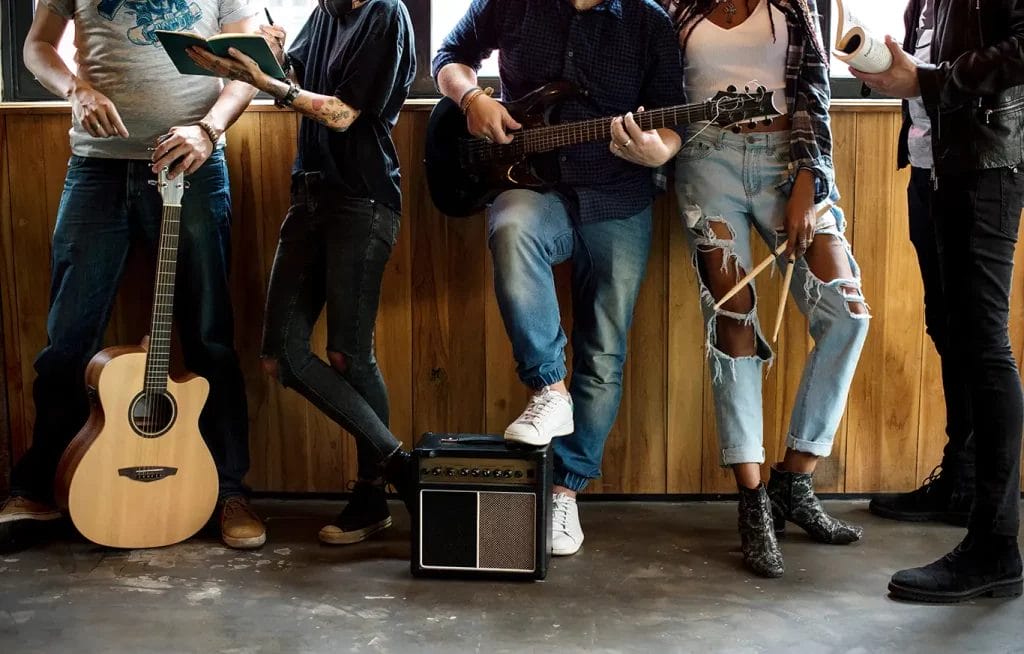- Last Updated:
- 9/18/2024
- Chelsea Ramsey

JoAnne Hammer | Program Manager
JoAnne Hammer is the Program Manager for Insurance Canopy. She has held the prestigious Certified Insurance Counselor (CIC) designation since July 2004.
JoAnne understands that starting and operating a business takes a tremendous amount of time, dedication, and financial resources. She believes that insurance is the single best way to protect your investment, business, and personal assets.
JoAnne Hammer is the Program Manager for Insurance Canopy. She has held the prestigious Certified Insurance Counselor (CIC) designation since July 2004.
JoAnne understands that starting and operating a business takes a tremendous amount of time, dedication, and financial resources. She believes that insurance is the single best way to protect your investment, business, and personal assets.
When you’re on stage or in the studio, the last thing on your mind is insurance… Until a speaker blows, an outlet sparks, or a fan gets hurt. Then you might be forced to face the music.
But you don’t need to sight read it if things go wrong during a gig or recording session. Band insurance can protect you and your group from the financial consequences of accidents and other unexpected incidents.
Here’s what you need to know to make protecting your brand and your band easier than playing chopsticks.
Why Do Bands Need Liability Insurance?
Regardless if you’re playing to a group of 10 or 100, public liability insurance is a must for multiple reasons.
Accounts for Common Risks (Claims and Scenarios)
Accidents can happen during performances, rehearsals, or event set-up and tear-down — no matter how practiced you are. And you can’t always control the actions of your audience members.
Someone could knock over a speaker and break it, trip over a cable and sprain their ankle, or a group member could accidentally put a hole in the venue’s wall. Musician and band insurance can help cover the cost of medical expenses, legal fees, or property damage if claims like these are made against the group.
Safeguards Your Finances and Career
Lawsuits are expensive. If your band has to deal with one it could easily bankrupt your whole business, leaving you and your bandmates on the hook financially. Liability insurance can help cover legal fees and/or payouts for claims.
Projects Professionalism and Credibility
Maintaining insurance demonstrates your band’s ability to act professionally and proactively. It shows that you are organized and take your business seriously. All of which adds to your credibility as a cohesive entity.
Meets Contractual Requirements to Help You Book Gigs
Many venues, festivals, events require musicians to carry their own liability insurance before performing. Get in front of the potential competition for stage time by showing you’ve already taken care of these details and are ready to go right away.
What Are the Risks of Skipping Insurance for a Band?
Skipping out on insurance sets you up for failure should anything go wrong before, after, or during a gig (or rehearsal, or recording session). If a fan gets hurt, a venue or rented space gets damaged, or a piece of equipment breaks, you and your bandmates could be held liable. Paying even just a single claim could run into the tens of thousands of dollars.
If you don’t have the cash to take care of these things, you run the risk of bankrupting yourself and the band. Even if you were to survive the financial obligations, you still run the risk of ruining your reputation with venues and organizers as either too risky or unreliable.

What Does Band Liability Insurance Cover?
General Liability
General liability coverage (also known as band public liability insurance) can protect your business from the cost of third-party bodily injury and property damage claims.
For example, if a speaker falls on someone’s arm and breaks their arm. You could be held responsible and have to pay their hospital bills. The person who was injured might take you to court to argue for even more money for their damages. The best-case scenario here would be that you aren’t found responsible in court, but you may still have to pay expensive attorney fees.
The general liability coverage in your insurance policy could cover some of those lawyer fees and damages you’re found liable to pay.
Products–Completed Operations
This part of your policy applies to damage or injuries related to products or services you provided after the services have been completed or products were delivered. In your band’s case, here’s a scenario where this coverage protects you financially:
- Some merch you sell at a concert, like a guitar strap, breaks, causing your fan’s guitar to fall and become damaged
- If the fan who bought the guitar strap that broke decides to sue, this coverage could help pay for legal defense costs
Personal and Advertising Injury
This part of your policy protects against the cost of third-party claims related to harm or injury that is not physical injury. This includes things like malicious prosecution, slander, libel, or invasion of privacy.
Advertising injury insures offenses in connection with advertising of goods or services as well as libel, slander, invasion of privacy, and copyright infringement. This coverage could apply in cases like:
- Your band name or logo ends up being too similar to an existing brand, to the point that brand accuses you of copyright infringement
- You or a bandmate make negative comments at a gig about a previous venue that end up causing damage to that venue’s reputation, and they sue you for slander
- You use another person or business’s name or image in your advertising materials without their permission

Damage to Premises Rented to You (Any One Premises)
This coverage can protect your business from the cost of claims arising from damages done to rented spaces, like space leased for practice or a studio rented for a recording session. For example, you could accidentally damage equipment at a recording studio or break one of the venue’s speakers while rehearsing or performing.
Medical Expense Limit
This is designed to cover minor medical expenses accrued by third-parties injured on your premises or as a result of your business operations, regardless of who is at fault. It can provide quick and efficient payouts without the need for long or complicated legal proceedings.
For example, someone watching you perform trips, hits their head on a speaker, and needs to get three stitches at Urgent Care.
Additional Insureds
Additional insureds are individuals or entities you’re required to add to your policy that are not automatically included. Venue owners or event organizers will often require you to name them as an additional insured before you can rent or play in their space, for example. This is so they will have some protection in case someone names them alongside you in a liability lawsuit.
Insurance Canopy provides unlimited additional insureds for a one-time $10 fee. Provide the additional insured’s information when filling out your application or come back at any time to add them to your policy from your customer dashboard.

Terms and Limits
You will see terms like “aggregate”, “limit” and “occurence’ when applying for or reading your policy. Here’s what those terms mean:
- Aggregate Limit: The total amount your insurance will pay for all covered losses in a specified time period (usually a year).
- General Liability Aggregate Limit: The total amount your general liability policy will pay out in that specified time frame. A band policy covers up to $2 million.
- General Each Occurrence Limit: The maximum amount the policy will pay for any one incident. Band policies cover up to $1 million per occurrence.
What these things look like in action might be something like:
A large speaker tips over, causing a chain reaction of knocking over multiple pieces of equipment and injuring an audience member. The policy would pay up to $1 million for this incident, or occurrence.
Say this event required your policy to pay out the whole $1 million. Then another incident occurred later, costing $500,000. The most your policy would pay out max for the remainder of the policy year after that would be $500,000 max.
- Products–Completed Operations Aggregate Limit: The same as the general liability aggregate limit, except in regard to the type of claims covered. These would be claims involving damage or injuries related to products or services you provided. This is also set at $2 million in a standard band liability policy.
- Personal and Advertising Injury Limit: The total amount your policy will pay for claims involving non-physical harm to third parties, like slander or copyright infringement. Standard band insurance covers up to $1 million.
- Damage to Premises Rented to You Limit: This coverage is designed to pay if you accidentally damage a rented studio, rehearsal, or event space. Standard band policies cover up to $300,000. (Note, general liability still applies to third parties like these as well.)
- Medical Expense Limit: The maximum “no-fault” amount of coverage for third party injuries the insurance will pay — up to $5,000 on a standard policy.

Additional Coverages
Annual band policies also include the option to add on extra coverages. These include:
- Equipment and Gear Coverage: Designed to help protect you from the costs of replacing or fixing your gear if it gets damaged or stolen. You can elect either $2000 or $5000 worth of coverage if you choose to add this to your policy.
- Excess Liability Coverage: Can be purchased in increments of $1,000,000. If an event or venue requires you to have more than $2 million in your general liability policy, you can purchase excess liability limits to fit the requirements.
- Cyber Liability Coverage (aka Data Breach Insurance): Designed to help protect you against the cost of data breaches or cyber-attacks on your business. Coverage up to $100,000 per policy year to help pay for claims, legal fees, data restoration efforts, and more.
How Can We Manage and Reduce Our Risks as a Band?
Smart, safe practices, often referred to as “risk mitigation” or “risk management” can reduce the risks associated with performing, renting spaces, and running your band — which is also a business.
- Good risk-management things include:
- Getting clear and specific written contracts
- Properly stowing equipment in locked vehicles, rooms, lockers, buildings
- Hiding and securing all cords, equipment, and so on to reduce trip and fall risks
- Confirming if there are permits or licenses you need before performing
- Familiarizing yourself with venues’ safety procedures
- Engaging the audience responsibly
- Communicating with staff and asking questions about the venue, past incidents, and more

How Much Does Band Insurance Coverage Cost?
The cost of band insurance event policies start at $59 and cover you for 1-3 days. Annual policies start at $18.50 per month or $199 a year. Your cost could increase if you add additional coverage or need to increase the limits of your base policy.
If you opt to protect your gigs year-round, you have access to even more protection. You can add on additional gear, cyber, and/or additional liability coverage for an extra cost.
A single claim could cost you thousands, or tens of thousands. While insurance costs the same or less than a quality hard guitar case. The risks of facing a claim or lawsuit solo far outweigh the cost of public liability insurance, even for the occasional gig.
Does Band Insurance Protect Our Gear and Instruments?
Not on its own. Band liability coverage applies to third-party injury or property damage claims. But with an annual policy you can opt-in to additional gear coverage that will help protect your instruments and other gear.
What Happens If We Need to File a Claim?
You can file a claim directly through your dashboard: Log into your account, select “manage policies” or “claims,” and then click “file a claim”. You are also welcome to call our customer service line at 844-520-6993 during business hours (8 a.m. to 8 p.m. Eastern, Monday through Friday, excluding holidays) to speak with a licensed agent who can help walk you through the process.

Does Band Insurance Cover Space We Rent?
Yes! Damage to Premises Rented to You Limit (Any One Premises) is part of your policy, and the General Liability portion of your policy can also respond to third parties like these. If you are renting the space for seven (7) days or less, this will cover damage from any cause. If you are renting a space for longer than seven days, it only covers damage caused by fire (that is accidentally caused by your business).
Does a Band Need Insurance for Studio Sessions?
Absolutely. In fact, most studios will require you to have insurance, and some may even require you to add them as an additional insured on your policy.
Even if a studio doesn’t require your band to have insurance, your session contract will likely state that you are financially responsible for certain damages if you cause them. So it’s a good idea to have band insurance regardless when using rented spaces — the risks outweigh the costs.
Does Insurance Cover Damage to a Space Our Band Rents to Practice?
Yes, it is the same coverage listed above: Damage to Premises Rented to You. Also, General Liability is designed to cover third party property damage claims, including for spaces your band leases as part of its business operations.
Is It Hard to Buy Band Insurance?
Insurance lingo is complicated enough without needing to shuffle through a bunch of paperwork or spend valuable time going back and forth with an agent just to get a quote. Through Insurance Canopy, you can reduce the time and know-how needed to apply for insurance insurance applications from Bohemian Rhapsody to Happy Birthday. Get band insurance online within minutes, with an instant certificate of insurance for proof.





